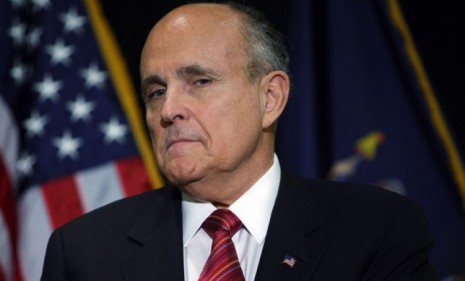Are U.S. anti-terrorism laws too broad?
A Georgetown law professor says big-name Republicans may have broken the law by talking nice about an Iranian opposition group on the U.S. list of foreign terror organizations

A free daily email with the biggest news stories of the day – and the best features from TheWeek.com
You are now subscribed
Your newsletter sign-up was successful
U.S. anti-terror laws came under scrutiny this week, after Georgetown law professor David Cole said in The New York Times that the laws are so far-reaching that they are squelching free speech. To illustrate the point, Cole said that several big-name Republicans — including former attorney general Michael Mukasey, former New York mayor Rudolph Giuliani, and former Homeland Security secretary Tom Ridge — could theoretically be prosecuted for speaking in support of an Iranian opposition group, Muhaheddin-e Khalq (MEK), at a Paris forum in December. Giuliani said it's a "disgrace" that the Obama administration is keeping the MEK on the list of foreign terrorist groups — but, Cole said, as long as the group remains on the list, encouraging it in any way is a felony. Did the Republican leaders go too far, or is the law the problem?
Sorry, the law is the law: Like Cole, I believe what these Republicans said "should be deemed constitutionally protected free expression," says Glenn Greenwald in Salon. But the law doesn't see it that way. "There are people sitting in prison right now with extremely long prison sentences for so-called 'material support for terrorism' who did little different than what these right-wing advocates just did." The Obama administration won't prosecute Mukasey, but it could.
"Leading conservatives openly support a terrorist group"
The Week
Escape your echo chamber. Get the facts behind the news, plus analysis from multiple perspectives.

Sign up for The Week's Free Newsletters
From our morning news briefing to a weekly Good News Newsletter, get the best of The Week delivered directly to your inbox.
From our morning news briefing to a weekly Good News Newsletter, get the best of The Week delivered directly to your inbox.
The terror list is what needs to be changed: The only reason the MEK was branded a terror group in 1997, says Ali Safavi in The Huffington Post, was to encourage "what was then perceived to be a 'moderate' drift in Tehran's ruling circles." But now it's clear the criminals are the mullahs who run Iran — not the MEK. And it certainly isn't just Republicans who want the group removed from the terror list. A House bill supporting the MEK has 70 Democratic co-sponsors.
"The West's monologue with Tehran"
Like it or not, the law is here to stay: "I can't imagine a Democratic Congress, let alone a Republican one, changing the anti-terror laws any time soon," says Nick Baumann in Mother Jones. "Cole's op-ed is drawing attention to the huge amount of power the current law gives to prosecutors." But it's not intended to quiet public figures — it's there to allow the government to target "leftist, pro-Palestinian, and anti-war activists." So there's one set of unspoken rules ensuring current and former government officials can speak freely, "and another set of rules for everyone else."
"Is Michael Mukasey helping terrorists?"
A free daily email with the biggest news stories of the day – and the best features from TheWeek.com